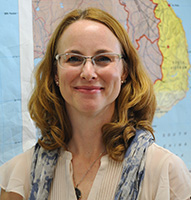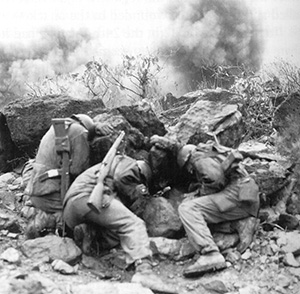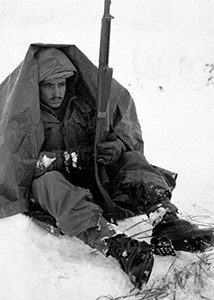Interview: Melinda Pash, Why is Korea the "Forgotten War"? |
| Originally published by American History magazine. Published online: March 31, 2014 |
The Korean War, which ended just over 60 years ago, never resonated with the American public in the way that World War II did, despite the fact that nearly 2 million Americans served in theater (as part of a United Nations force) in the three-year fight against the North Koreans and Chinese, and some 37,000 died. Perhaps it was because Korea wasn't a "declared war" and ended in an unsatisfactory stalemate. Melinda Pash, a history instructor at Fayetteville (N.C.) Technical Community College, has written a book on the conflict, In the Shadow of the Greatest Generation: The Americans Who Fought the Korean War (New York University Press, 2012), which examines this significant but neglected 1950s war.

Pash spent six years working on the book, which she wrote to "give voice" to Korean vets. (Brad Losh)
How did the Korean War get dubbed the "forgotten war"?
Korea has been called a "forgotten war" since at least October 1951 when U.S. News & World Report gave it that moniker. In reality, though, Americans did not so much forget the Korean War as never think about it at all. When the war first broke out, people worried that American involvement would usher in the same type of rationing and full mobilization that had characterized the Second World War. That failed to occur and within a few months most Americans turned back to their own lives, ignoring the conflict raging half a world away. Newspapers continued to report on the war, but with the entrance of the Chinese in late fall 1950 and the resulting stalemate in late 1951, few Americans wanted to read or think about Korea.
What distinguishes our Korean War military generation?
In some cases, nothing. About one-fourth of Korean War veterans also served in World War II and many went on to serve in the Vietnam War. Perhaps the most distinctive characteristic of the Korean War generation is their silence. Veterans of both World War II and the Vietnam War came back to talk about what they did and to form and join veterans organizations, but Korean War veterans came home and tried to pick up their old lives and forget their wartime experiences. Many did not even tell their wives or children that they served in Korea.
America wasn't really prepared for that conflict, and yet you write that no American youths were more willing to serve.
As children of the Great Depression and the Second World War, they were conditioned to volunteer and to serve their country. They had planted victory gardens, lived through rationing, taken up the slack at home when fathers left to find work or enter the military, and they had internalized a strong sense of patriotism. So, when called to fight in Korea, this generation willingly volunteered. In fact, only one-third of those who served in the Korean War era were drafted and, though nearly as many draftees served in the three years of the Korean War as in the 10 years of Vietnam, draft-dodging was a rarity.
What accounted for the strong public interest in the idea that American POWs were brainwashed?
Despite popular depictions of the 1950s as an era of good times and prosperity, the decade was fraught with Cold War anxieties and fear. Newspapers carried stories of UFOs, people built bomb shelters in their backyards, and movies depicted all kinds of threats like the Blob. But no menace frightened Americans so much as communism. And that fear was heightened by the Korean War POW exchanges. At Little Switch in April 1953, Army psychiatrist William Mayer suggested that most POWs had collaborated with the enemy, and at Big Switch a few months later 21 Americans refused repatriation. Americans needed an explanation—and brainwashing fit the bill. This triggered all sorts of speculation about what went wrong, with heavyweights like Dr. Spock and Betty Friedan arguing that the men who served in Korea were weak, coddled by their mothers, failed by a broken educational system and simply lacking in the right stuff. Eventually, research showed that most of the 21 had social problems before Korea—absent fathers, race or sexual orientation issues—but by then the entire Korean War generation of veterans had been stigmatized.

A U.S. combat team shields itself from Chinese mortar fire. (National Archives)
The numbers speak volumes. Of more than 7,000 confirmed American POWs, only 4,400 made it home alive. Undoubtedly, many POWs cooperated to some degree with the enemy while in captivity, but survival required it. American POWs in Korea experienced a level of torture and abuse largely absent from previous wars, and this alone accounts for many of the breaches in military policy. Both the Chinese and Koreans forced American prisoners to endure death marches, extreme privation and harsh punishments. Weather and terrain made escape from the camps in North Korea impossible, as did the hostility of civilians toward U.N. troops. The Army initiated courts-martial against 13 soldiers for collaboration, but given the extreme circumstances one cannot view the issue in terms of courage. Rather, the survivors, by virtue of the fact that they survived, should all be counted as heroes.
In 1951 Supreme Commander Matthew Ridgway started enforcing integration. Why?
Two words—military efficiency. Segregated units tended to suffer from morale and other problems, and segregation itself slowed the replacement pipeline. In the early months of the war, commanders in Korea suffered acute manpower shortages and so began to fill vacancies in their units without regard to color. These unauthorized integrated units worked so well that in May 1951 General Ridgway formally requested and received permission to abolish segregation in the Far East Command.
You write that after 1953 military service offered African Americans their best shot at equality.
Absolutely. The desegregation of the military in Korea breathed life into President Harry Truman's 1948 executive order calling for equal treatment and opportunity in the Armed Forces. While most African Americans in civilian society in the 1950s still suffered greatly from discrimination and Jim Crowism, blacks in the military increasingly lived and worked in an integrated world where leadership positions and rank were open to them. Eventually, the military even pushed for integrated housing, schools and recreational facilities in communities servicing military installations. In the end, demonstrating that integration could work proved to be one of the most enduring legacies of the Korean War.
What did the hit TV show M*A*S*H get right about the Korean War?
GIs wanted to go home. Korea's frigid winters, blistering summers and endless ridgelines made serving in Korea rather miserable. MASH units operated near the front lines, with doctors and other personnel working incredibly hard and sometimes facing grave danger. Maybe more important is what M*A*S*H got wrong. With 37,000 American dead in 3 years—compared to 58,000 dead in the much longer Vietnam War—Korea really wasn't very funny. Also, the attitudes depicted in the show belong more to the Vietnam War. The Korean War generation tended to be serious and patriotic rather than cynical.

Pfc Preston McKnight tries to keep warm in Yoju in January 1951. (National Archives)
Congress did not issue a declaration of war, and President Truman did not call Korea a war—he called it a "police action." Today, Americans can look at Korea, Vietnam, even Iraq and Afghanistan and recognize all of these as wars. But in the 1950s no precedent existed for acknowledging a military conflict as a war in the absence of a formal declaration. The later designation probably did not stem from some retroactive epiphany but rather from the need to deal with veterans' medical and other issues, since war veterans earned different benefits than peacetime veterans.
Why have Korean War soldiers never been adequately recognized?
Invisibility. Much like the soldiers in Afghanistan, the 1.8 million Americans who fought in Korea rotated in and out of the war zone without attracting much attention. People barely noticed the new generation of combat veterans trickling home. Recognition might have followed the armistice, but in 1953 Americans, even the veterans themselves, widely regarded the Korean War as anything but a victory. The long shadow cast by the "greatest generation" shaded Korean vets from public view until veterans of the Vietnam War took center stage, rendering the veterans of Korea even more invisible.
'6.25 動亂史' 카테고리의 다른 글
| 함안 남강변의 전투 경찰 혈투사 (0) | 2017.07.05 |
|---|---|
| 戰死 아들 만나려… 엄마는 10년간 뱃삯 모았다 - 6·25 참전 호주군 병사의 모친, 56년전 3등칸 1만5000㎞ 부산행 (0) | 2017.05.23 |
| 부산 국제시장서 만난 진짜 '덕수'들 (0) | 2015.10.05 |
| 일곱 살 때 들은 <赤旗歌(적기가)> (0) | 2015.10.04 |
| Re-Enacting the Korean War (0) | 2015.10.02 |
